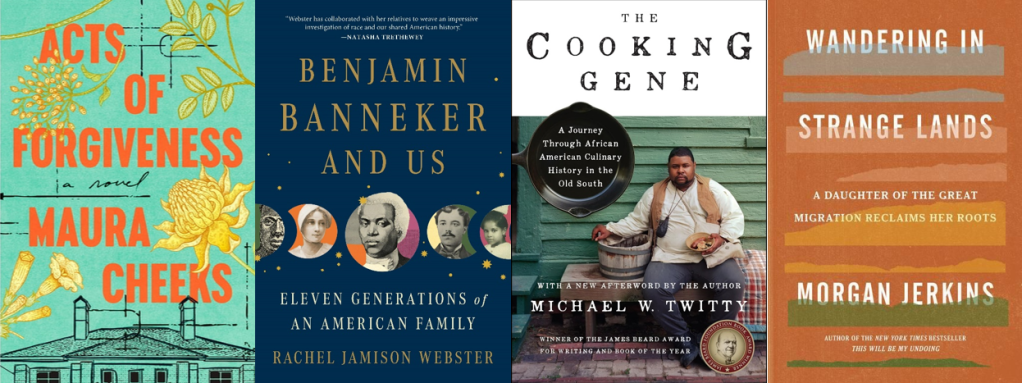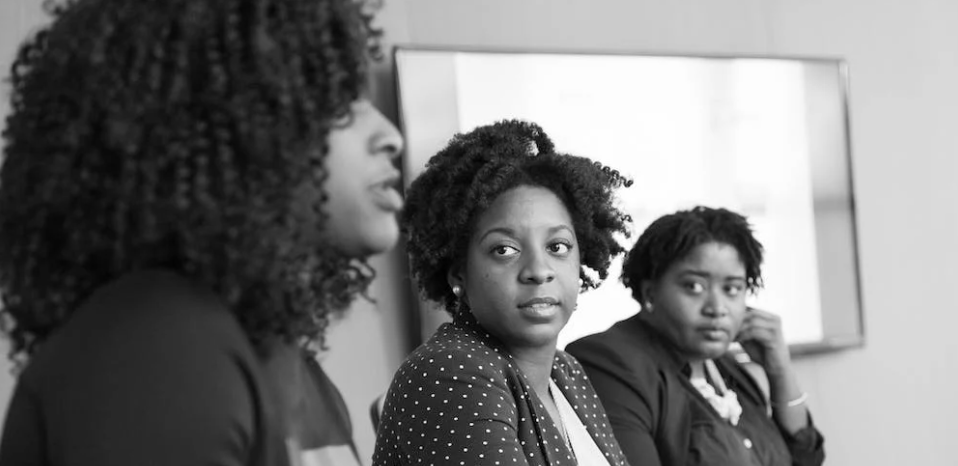Do you enjoy reading or listening to memoirs and family histories? Sometimes, reading or listening to the stories of others can help you as you seek to write your own story. The act of listening can bring us closer to others as well as ourselves. Reading and listening to others’ ancestral and personal stories may also be a way of opening up a conversation with your own ancestors.
This Black History Month, consider reading or listening to these books from the library’s collection. Each one centers the experiences of African American families and individuals who are navigating the contours of their histories. Their stories are powerful explorations of the past and present, and they help us understand our shared experiences and histories better!

Acts of Forgiveness by Maura Cheeks
“In this big-hearted debut [novel] about ambition, race, and class, a family grapples with how much of their lineage they’re willing to unearth in order to participate in the nation’s first federal reparations program…Willie delves deeper into her family’s history, while also trying to keep the family from going into bankruptcy. Acts of Forgiveness reveals the ways historical discrimination can manifest in the present…But for reasons both justifiable and cryptic, the rest of the family is hesitant and wary of what pursuing Forgiveness could mean…It’s up to Willie to verify their ancestry and save her family from financial ruin–but as she delves into their history, Willie begins to learn just how complicated family can really be…Acts of Forgiveness asks how history shapes who we are, to consider the weight of success when it is achieved despite incredible odds, and what leaving behind a legacy truly means.”
Benjamin Banneker and Us by Rachel Jamison Webster
“A family reunion gives way to an unforgettable genealogical quest as relatives reconnect across lines of color, culture, and time, putting the past into urgent conversation with the present…Rachel Jamison Webster, an ostensibly white woman, learns that this groundbreaking Black forefather is also her distant relative. Acting as a storyteller, Webster draws on oral history and conversations with her DNA cousins to imagine the lives of their shared ancestors across eleven generations, among them Banneker’s grandparents, an interracial couple who broke the law to marry when America was still a conglomerate of colonies under British rule. These stories shed light on the legal construction of race and display the brilliance and resistance of early African Americans in the face of increasingly unjust laws, some of which are still in effect in the present day.”
The Cooking Gene by Michael Twitty
“A renowned culinary historian offers a fresh perspective…in this illuminating memoir of Southern cuisine and food culture that traces his ancestry…through food, from Africa to America and slavery to freedom…In this unique memoir, culinary historian Michael W. Twitty takes readers to the…center of this fight, tracing the roots of his own family and the charged politics surrounding the origins of soul food, barbecue, and all Southern cuisine…Twitty tells his family story through the foods that enabled his ancestors’ survival across three centuries. He sifts through stories, recipes, genetic tests, and historical documents, and travels from Civil War battlefields…to synagogues…As he takes us through his ancestral culinary history, Twitty suggests that healing may come from embracing the discomfort of the…past. Along the way, he reveals a truth that is more than skin deep—the power that food has to bring the kin of the enslaved and their former slaveholders to the table, where they can discover the real America together.”
Wandering in Strange Lands by Morgan Jerkins
“An acclaimed cultural critic presents the story of her journey to understand her northern and southern roots, the Great Migration, and the displacement of black people across America. Between 1916 and 1970, six million black Americans left their rural homes in the South for jobs in cities in the North, West, and Midwest in a movement known as The Great Migration. This event transformed the complexion of America and provided black people with new economic opportunities, but also disconnected them from their roots, their land, and their sense of identity. Jerkins recreates her ancestors’ journeys across America, following the migratory routes they took from Georgia and South Carolina to Louisiana, Oklahoma, and California. She did this not only her own past, but the lineage of an entire group of people who have been displaced, disenfranchised, and disrespected throughout our history.”

We would love to hear from you! If you choose to read one of these (or a related one), let us know what you think.
Maybe you have already read these, or maybe you are ready to collect your own ancestral stories? If you are looking to get started with your own African American family history research, check out this exciting, free online seminar on February 24!
Discover more from Cook Memorial Public Library District
Subscribe to get the latest posts sent to your email.
Categories: Genealogy
